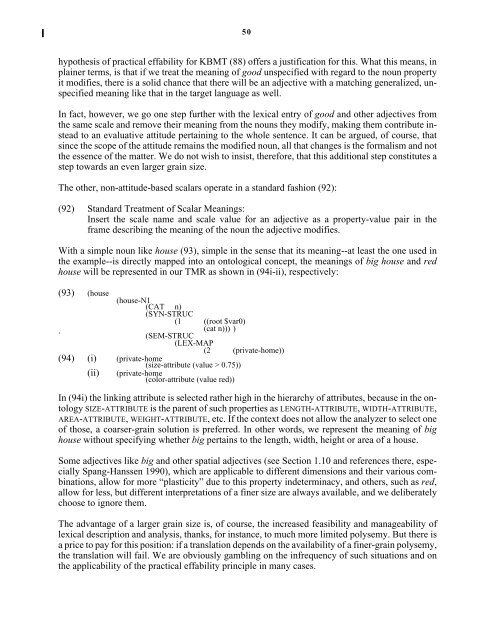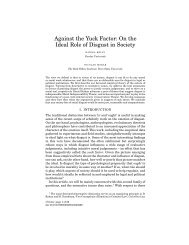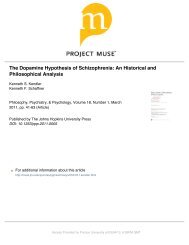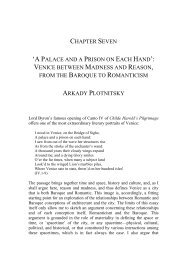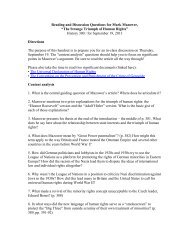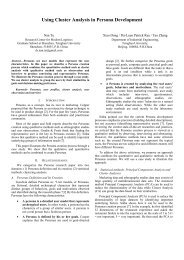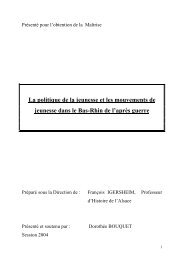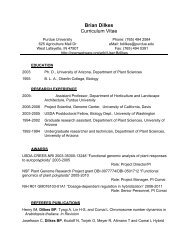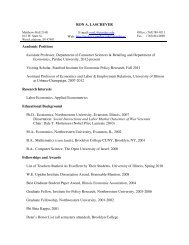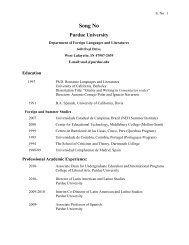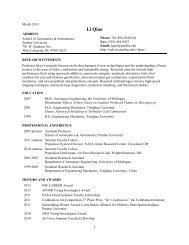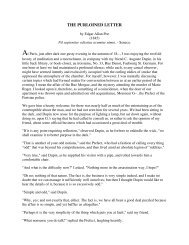Lexical Semantics of Adjectives - CiteSeerX
Lexical Semantics of Adjectives - CiteSeerX
Lexical Semantics of Adjectives - CiteSeerX
Create successful ePaper yourself
Turn your PDF publications into a flip-book with our unique Google optimized e-Paper software.
50<br />
hypothesis <strong>of</strong> practical effability for KBMT (88) <strong>of</strong>fers a justification for this. What this means, in<br />
plainer terms, is that if we treat the meaning <strong>of</strong> good unspecified with regard to the noun property<br />
it modifies, there is a solid chance that there will be an adjective with a matching generalized, unspecified<br />
meaning like that in the target language as well.<br />
In fact, however, we go one step further with the lexical entry <strong>of</strong> good and other adjectives from<br />
the same scale and remove their meaning from the nouns they modify, making them contribute instead<br />
to an evaluative attitude pertaining to the whole sentence. It can be argued, <strong>of</strong> course, that<br />
since the scope <strong>of</strong> the attitude remains the modified noun, all that changes is the formalism and not<br />
the essence <strong>of</strong> the matter. We do not wish to insist, therefore, that this additional step constitutes a<br />
step towards an even larger grain size.<br />
The other, non-attitude-based scalars operate in a standard fashion (92):<br />
(92) Standard Treatment <strong>of</strong> Scalar Meanings:<br />
Insert the scale name and scale value for an adjective as a property-value pair in the<br />
frame describing the meaning <strong>of</strong> the noun the adjective modifies.<br />
With a simple noun like house (93), simple in the sense that its meaning--at least the one used in<br />
the example--is directly mapped into an ontological concept, the meanings <strong>of</strong> big house and red<br />
house will be represented in our TMR as shown in (94i-ii), respectively:<br />
(93) (house<br />
(house-N1<br />
(CAT n)<br />
(SYN-STRUC<br />
(1 ((root $var0)<br />
(cat n))) )<br />
` (SEM-STRUC<br />
(LEX-MAP<br />
(2 (private-home))<br />
(94) (i) (private-home<br />
(size-attribute (value > 0.75))<br />
(ii) (private-home<br />
(color-attribute (value red))<br />
In (94i) the linking attribute is selected rather high in the hierarchy <strong>of</strong> attributes, because in the ontology<br />
SIZE-ATTRIBUTE is the parent <strong>of</strong> such properties as LENGTH-ATTRIBUTE, WIDTH-ATTRIBUTE,<br />
AREA-ATTRIBUTE, WEIGHT-ATTRIBUTE, etc. If the context does not allow the analyzer to select one<br />
<strong>of</strong> those, a coarser-grain solution is preferred. In other words, we represent the meaning <strong>of</strong> big<br />
house without specifying whether big pertains to the length, width, height or area <strong>of</strong> a house.<br />
Some adjectives like big and other spatial adjectives (see Section 1.10 and references there, especially<br />
Spang-Hanssen 1990), which are applicable to different dimensions and their various combinations,<br />
allow for more “plasticity” due to this property indeterminacy, and others, such as red,<br />
allow for less, but different interpretations <strong>of</strong> a finer size are always available, and we deliberately<br />
choose to ignore them.<br />
The advantage <strong>of</strong> a larger grain size is, <strong>of</strong> course, the increased feasibility and manageability <strong>of</strong><br />
lexical description and analysis, thanks, for instance, to much more limited polysemy. But there is<br />
a price to pay for this position: if a translation depends on the availability <strong>of</strong> a finer-grain polysemy,<br />
the translation will fail. We are obviously gambling on the infrequency <strong>of</strong> such situations and on<br />
the applicability <strong>of</strong> the practical effability principle in many cases.


